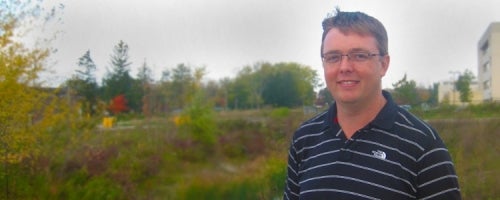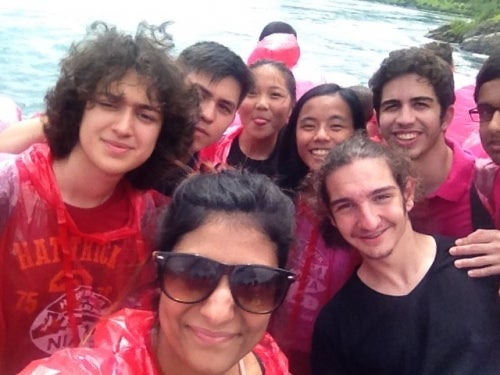The Daily Bulletin is published by Internal and Leadership Communications, part of University Communications
Contact us at bulletin@uwaterloo.ca
Submission guidelines
Editor:
Brandon Sweet
Marketing & Strategic Communications
bulletin@uwaterloo.ca

By Sophie Twardus. This is the first of five Centre for Teaching Excellence Teaching Stories that will appear in the Daily Bulletin over the next two weeks.
Most instructors have a metaphor that embodies their approach to teaching. Sometimes they’re conscious of this metaphor, but sometimes not. Either way, it informs and imbues how they teach. In the case of Dr. Jason Grove – who teaches chemical engineering – he identifies his teaching metaphor as that of the guide: “Teaching is about guiding other people to learn. Learning is a personal journey that you have to undertake for yourself.”
Grove uses case studies to guide his students along their learning journeys. Case studies – which are accounts of real-life situations that feature relevant stakeholders and their competing interests – might initially seem out of place in a chemical engineering course, at least if we assume that such courses focus only on molecules and materials. However, Grove’s courses focus on the environment: what negative effects certain chemical procedures might have on the environment, how to minimize those effects, and even what the legal ramifications might be. Needless to say, in such situations there is no simple “right” answer. That in itself is a valuable lesson for the students, who often initially expect Grove to supply them with the “correct” evaluation of the case study. The case studies, however, are necessarily ambiguous, which makes them reflect the murky realities that students will encounter in the workplace.
“Students,” says Grove, "aren’t sure how to approach the issues that are represented in a case study, and that uncertainty is what makes cases valuable. A case study gets students to think about the process they are using, about their assumptions, and about whether the results look sensible."
Even after students work through a case study, Grove is loath to provide them with a “tidy” answer. “I’m resistant to lecturing the ‘correct’ answer afterwards,” he says, “because that implies that there is a single, ‘real’ answer.” Instead, Grove and his students engage in some “wrap up,” to bring closure to the case and to ensure that all the relevant aspects have been considered.
Grove notes that case studies are a form of “active learning,” and the critical thinking that students develop by working with them are, in his view, the most important skill they learn. “They need to be able to take evidence, evaluate it, and draw their own conclusions.”
With Jason Grove, students are certainly in the hands of an expert guide as they undertake their journey of learning.

This is an excerpt of an article that was originally published on the Waterloo International news site.
Last week twenty international high school students from eight countries arrived in Waterloo to take part in IDEAS,
a two-week summer enrichment program designed for high school students from around the world. Over the two-week program, which runs from July 12 – July 26, IDEAS Summer Experience participants attend lectures and workshops and learn valuable skills that will help develop their big ideas to try and solve some of the world’s most serious challenges. IDEAS encompasses academic programming from all six faculties and teaches participants about innovation and entrepreneurship as well as exposing them to what it is like to attend a North American University. Twelve males and eight females have joined IDEAS from China, Turkey, Indonesia, Bermuda, Ghana, Jordan, Hong Kong and Singapore.
IDEAS is a very immersive and interdisciplinary program in which participants can enjoy the best of what UWaterloo has to offer in a wide range of subjects and disciplines. Participants attended lectures and workshops from many of UWaterloo’s renowned professors and staff. Amongst the many guest lecturers for IDEAS was Ron McCarville, Associate Dean for Undergraduate Studies and Professor in Recreation and Leisure Studies, who presented on how decisions we make in our daily life affect our health. Linda Carson, who helped develop the Knowledge Integration program, presented on creativity and ideation and how to think creatively to solve problems. Geoff Malleck in the Faculty of Arts lectured on creativity, entrepreneurship and team dynamics. Participants also took part in interactive workshops such as learning about Ecology by taking water samples from Laurel Creek and learning about body language and movement with Andrew Houston, Associate Professor in Drama and Speech Communication. Participants spend time most days with instructors from Renison’s English language program learning about leadership skills, research techniques, collaboration and critical thinking, just to name a few. Last week, participants also toured Velocity Garage to learn more about Waterloo’s innovation and entrepreneurial ecosystem and attended the Velocity Fund Finals on July 23rd.
Read the rest of the article on the Waterloo International website.
The fifth annual NanoMRI Conference is set for July 27 to July 31 and promises to bring together an interdisciplinary community of scientists and engineers researching in the field of ultrasensitive spin detection and nanoscale magnetic resonance imaging.
This year’s speakers are a select group from three communities:
Topics at this year’s conference include an overview of present-day nanoscale microscopy technology, novel mechanical resonators, and ferromagnetic microscopy, to name a few.
The conference is taking place at the Mike and Ophelia Lazaridis Quantum-Nano Centre.
What's happening: University Avenue will be closed from Phillip Street to Ring Road/Seagram Drive as crews continue work on the CN railway tracks.
When: starting on or around July 27 for approximately three weeks. (The work has been pushed back from July 24.)
The impact: From Monday to Friday, one lane will be open for traffic heading Eastbound towards Highway 85. On the weekends, the road will be completely closed as crews will be working throughout the night.
The work will also require closures of the Laurel Trail between University Avenue and Seagram Drive.
After the work on University Avenue is complete, crews will move on to Seagram Drive.
Check the ION-related travel disruptions website for more details.
Drop/Add Period begins, Monday, July 27.
NanoMRI Conference, Monday, July 27 to Friday, July 31, Institute for Quantum Computing.
Lectures end, Tuesday, July 28.
FemPhys Tea & Talk, Tuesday, July 28, 12:00 p.m., egg fountain outside MC.
Discovery Square presented by Faculty of Science, Tuesday, July 28, 5:00 p.m., Carl Zehr Square, Kitchener.
Pre-examination study days, Wednesday, July 29 to Monday, August 3.
EIT presents Dinosaur Tour, Wednesday, July 29, 1:00 p.m., Earth Sciences Museum.
SHAD public open house, Thursday, July 30, 1:30 p.m., Conrad Grebel University College Great Hall.
GreenHouse Social Innovation Showcase, Thursday, July 30, 4:00 p.m. to 5:30 pm, Alumni Hall, St. Paul’s University College.
August Civic Holiday, Monday, August 3, most University operations closed.
On-campus examinations begin, Tuesday, August 4.
Minerals Tour, Wednesday, August 5, 1:00 p.m., Earth Sciences Museum.
Online examination period, Friday, August 7 and Saturday, August 8.
Quantum Cryptography School for Young Students, Friday, August 7 to Friday, August 14, Institute for Quantum Computing.
Minerals Tour, Wednesday, August 12, 1:00 p.m., Earth Sciences Museum.
Perseids Meteor Shower Stargazing Party, Wednesday, August 12, 7:30 p.m., OPT 347.
Biomedical Discussion Group Lecture featuring Dr. Herbert Waite; University of California, Santa Barbara (UCSB) “Mussel Power: Defining the Essentials for Translation to Technology” Thursday, August 13, 3:30 p.m. to 4:30 p.m., E6-2024.
Examination period ends, Saturday, August 15.
Quantum Key Distribution Summer School, Monday, August 17 to Friday, August 21, Mike & Ophelia Lazaridis Quantum-Nano Centre Room 0101.
Instructional Skills Workshop - CTE601, Tuesday, August 18, 9:30 a.m., EV1 241.
Minerals Tour, Wednesday, August 19, 1:00 p.m., Earth Sciences Museum.
Retirement celebration for Peter Jordan, Wednesday, August 19, 3:00 p.m., Federation Hall.
Date for students to be "Fees Arranged", Thursday, August 27.
Spring co-operative work term ends, Friday, August 28.
Orientation Week, Saturday, September 6 to Saturday, September 12
Labour Day, Monday, September 7, most University operations closed.
Lean in Higher Education Conference, Thursday, September 10 to Friday, September 11, Federation Hall.
Lectures begin, Monday, September 14.
Hack4Health, Saturday, September 26 to Sunday, September 27, Waterloo Accelerator Centre.
Annual Traditional Pow Wow, Saturday, September 26, 12:00 p.m., Waterloo Aboriginal Education Centre, St. Paul's University College.
AHS Annual Fun Run, Saturday, October 3, 8:30 a.m., BC Matthews Hall.
Fall Teaching Week, Monday, October 5 to Friday, October 8.
The Daily Bulletin is published by Internal and Leadership Communications, part of University Communications
Contact us at bulletin@uwaterloo.ca
Submission guidelines
The University of Waterloo acknowledges that much of our work takes place on the traditional territory of the Neutral, Anishinaabeg, and Haudenosaunee peoples. Our main campus is situated on the Haldimand Tract, the land granted to the Six Nations that includes six miles on each side of the Grand River. Our active work toward reconciliation takes place across our campuses through research, learning, teaching, and community building, and is co-ordinated within the Office of Indigenous Relations.